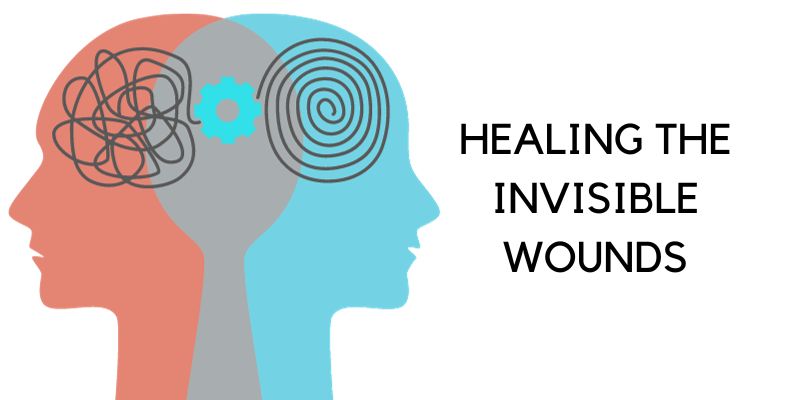We often think that only physical abuse, such as being hit or scolded, constitutes injury. However, there is another kind of injury that is invisible to the eye. It leaves no scars, yet it can cause a person to live in pain for the rest of their life—that is emotional neglect and indifference.
Many people have experienced certain events, but they seem to have never truly felt the impact of these events. They didn’t escape physically, but emotionally, they “drifted away.”
For example, when recalling the past, some people can’t remember the sequence of events. If you ask them, “When did your parents separate?” they might say, “It was around middle school… or maybe earlier.” If you ask, “When were you bullied for the first time?”He might say, “I don’t really remember, but it happened a lot.”
This vague description of time and experiences is not because he has a poor memory, but because his heart was not there at the time. He was physically present, but his emotions had long since fled.

Why is this? Because they never developed a clear ‘self’ from a young age, which is what psychologists refer to as “self-awareness.”
What is “self-awareness”?
It sounds a bit abstract, but it’s actually very simple. Self-awareness is the feeling that you are alive.
Being alive is not just about eating, sleeping, and breathing. More importantly, it’s about feeling that you really exist. For example:
These are all experiences of being alive.
But just having these feelings is not enough; you also have to be able to “accept” them.
It’s like when you buy a new cell phone, but everyone keeps telling you that you shouldn’t use it. Gradually, that cell phone becomes meaningless to you.
The same is true for emotions. If you grew up in an environment where you were not recognized or understood, even if you feel a certain emotion, you may not dare to admit it, or you may even feel that “I shouldn’t feel this way.”
Over time, you begin to disconnect from your emotions.
You slowly forget who you are and what you want.
Real-life example: She seems to have everything, but she can’t sleep
I once met a client named Catherine (not her real name), who was 50 years old and lived in a small county town. She had been retired for five years.
Her son had a stable job, her grandson was in school, and her family was financially well off. Her neighbors all said she was “the happiest woman.”
But she told me, “I can’t sleep well every day. When I wake up in the morning, I always feel tired and empty inside.”
She wakes up early every day to make breakfast for her grandson and send him to school. After finishing all this, she wants to rest, but finds she can’t sleep at all.
She said, “Sometimes I wake up in the middle of the night and can’t tell if I’ve really fallen asleep.”
This isn’t ordinary insomnia; it’s a manifestation of a psychological state.
When a person goes without care, understanding, and response for a long time, their heart becomes numb and empty.
I talked to her a lot, and one part of her conversation with her husband left a deep impression on me.
I asked her, “Have you told your husband how you feel?”
She said, “I have, but he always says I’m ‘making a big deal out of nothing.’ He says I don’t have to work and I’m just worrying about nothing.”
I asked, “How does he react when you talk to him?”
She said, “It’s like he doesn’t even want to hear what I have to say. As soon as I open my mouth, he gets annoyed.”
I asked, “Do you think he’s listening to you?”
She nodded, “No. I don’t think he understands my feelings at all. I just want him to understand me a little, even if it’s just saying, ‘You’re doing great.’”
What does this conversation tell us?
She longs to be seen, heard, and understood. But the reality is that not only does she not get these things, she is rejected and denied.
Over time, she began to doubt herself: “Am I too sensitive? Am I thinking too much?”
As a result, she became less and less willing to express her emotions and found it increasingly difficult to fall asleep.
Her problem actually started when she was a child
Through further communication, I discovered that Catherine’s distress did not just appear now, but was planted in her childhood.
She was the eldest child in her family and had to help her parents with housework and take care of her younger siblings from an early age.
Although she was an excellent student and the pride of her family, no one cared whether she was tired or happy.
Her parents rarely praised her or comforted her. She learned from an early age to swallow her grievances and hide her emotions.
When she grew up, she got married, but her husband was also someone who didn’t like to communicate or show consideration.
Her childhood experiences were repeated in adulthood.
She was used to being ignored, so when those around her didn’t respond to her emotions, she didn’t resist, but just endured silently.
But her body remembers the pain. So insomnia, anxiety, exhaustion, and emptiness became her body’s language.
This is called “emotional somatization” — when you can’t express your emotions with words, your body speaks for you.
What are the signs of emotional neglect?
Let’s take a look at some specific signs of emotional neglect:
These behaviors do not leave scars on children, but they leave deep cracks in their hearts.
When these children grow up, they often encounter the following problems:
Like a pot of water that never boils, they are neither hot nor cold, neither up nor down, leaving people unmotivated and unable to let go.
How can we rediscover our true selves?
To heal the trauma caused by emotional neglect, the most important thing is to reconnect with your emotions.
In this process, the role of a psychotherapist is not to give you advice, but to accompany you as you face your emotions, express them, and feel the emotions that have been suppressed for many years.
For example, in counseling, I will guide clients to slowly express their feelings:
These words may seem simple, but for many people, this is the first time in years that they have allowed themselves to express their true feelings.
This process may be painful at first, like cleaning a wound, but only by cleaning up these old wounds can they truly heal.
As they gradually release their emotions, they will slowly realize that:
When a person begins to truly know and accept themselves, their “self-awareness” will slowly return.
If you have experienced something similar, don’t be afraid
If you have had similar experiences:
Then, please stop and ask yourself:
“Have I been suppressing my emotions? Have I forgotten who I am?”
You are not alone. There are many people like you who have been ignored, misunderstood, and neglected. But now, you can choose a different way of life.
You can learn to feel, express, and accept yourself. You can slowly rediscover the real you.
Remember: your emotions are not a burden; they are a part of you.
When you are willing to face them, you will discover that you are stronger than you ever imagined.

